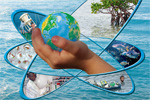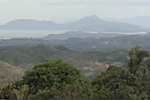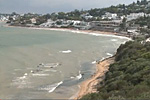Scientific Forum
The Blue Planet - Nuclear Applications for a Sustainable Marine Environment
17-18 September 2013
The Scientific Forum is taking place 17-18 September 2013 in Board Room D, C-Building, 4th Floor. The Forum will bring together scientists, experts and policy makers from different fields to initiate dialogue and build new partnerships and cooperation to protect and preserve the ecological balance that is vital for the survival of the coastal regions and marine environment. The Forum is being held in conjunction with the General Conference.
Resources
- The Blue Planet - Nuclear Applications for a Sustainable Marine Environment, Scientific Forum Report to General Conference, 18 September 2013
- Presentations: A complete listing of all of the presentations delivered at the Scientific Forum is available here, 17-18 September 2013.
- Director General's Statement to Scientific Forum, 17 September 2013 | Video →
- Prince Albert II of Monaco, Statement to Scientific Forum, 17 September 2013 | Video →
- Wendy Watson-Wright, Assistant Director General and Executive Secretary, UNESCO, Intergovernmental Oceanographic Commission, France, Statement to Scientific Forum, 17 September 2013 | Video →
- In Focus: Water
- IAEA Bulletin: Human well-being and prosperity depend upon healthy oceans and seas. Much of the oxygen we breathe is generated by marine life, while ocean currents transfer heat, playing an important role in maintaining a moderate climate. More →
- Conference Programme: From 17 to 18 September 2013, the IAEA's Scientific Forum on The Blue Planet - Nuclear Applications for a Sustainable Marine Environment, will bring together scientists, experts and policy makers from different fields to discuss ways to protect and preserve the ecological balance that is vital for the survival of the coastal regions and marine environment. Find more information about the Conference programme and venue here.
- IAEA Marine Environment Laboratory
- Monaco Declaration on Oceans, 2008
Additional Resources
- Science Needed in Search for Solutions to Help Troubled Oceans, 4 September 2013
- Video: Ocean Protection Advocate - Interview with Prince Albert II of Monaco, 3 September 2013
- Video: Using Nuclear Science to Study Ocean Acidification, 25 June 2013
- An Advocate for Ocean Protection, 7 June 2013
- Protecting Our Oceans Together, 7 June 2013
- IAEA Workshop Warns Ocean Acidification Threatens Seafood Supply, 20 November 2012
- Ocean Acidification - Cause for Alarm and Action, 18 June 2012
Director General Amano Address to Scientific Forum
Director General Yukiya Amano opened the Scientific Forum, stating that in dealing with threats to the health of the seas, governments need accurate data and skilled researchers who can devise accurate models to help predict future conditions, and that way, governments can start implementing the appropriate strategies to protect the seas and oceans. More → | Statement →
The Blue Planet – Nuclear Applications for a Sustainable Marine Environment – Statement to 2013 Scientific Forum from the IAEA.
Meeting Focuses on Nuclear and Isotopic Science to Protect Oceans

The marine ecosystems that keep the oceans healthy are subject to increasing stress. Levels of acidity are rising in a process that is taking place at a more rapid pace than ever observed before. This poses risks to all life in the ocean - and all who depend on the oceans. Press Release →
From Hilltops to Oceans - Managing Pollution in Manila Bay With Isotopic Techniques

Manila is just one of the world’s largest cities that are situated on the water’s edge. For these cities the oceans provide jobs, food and opportunities for transportation and recreation. But as pollutants move downhill, they are ending up on the shores and in the seas. Scientists from the Philippine Nuclear Research Institute (PNRI) are monitoring and managing the pollution in Manila Bay with the support of the IAEA. Video →
Shores of Resilience - Protecting Tunisia's Coastlines with Radionuclide Analysis

Tunisia's coastline stretches for over 1 300 kilometres. It's a major source of income for the people who live along the coast - that's around 80 percent of the country's population. But like many coastal countries around the world, this North African country is trying to cope with the pollution coming from industrial and domestic waste that is affecting the shorelines. The country's National Center of Nuclear Sciences and Technologies (CNSTN) takes part in a regional IAEA project that supports the use of nuclear and isotopic techniques to manage marine pollution. Video →
Live Video Streaming of Scientific Forum
Sessions of the Scientific Forum were live-streamed during the Forum on 17 and 18 September 2013.
